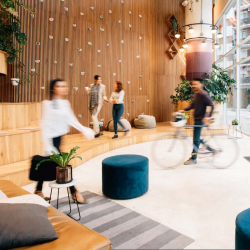To provide the best experiences, we use technologies like cookies to store and/or access device information. Consenting to these technologies will allow us to process data such as browsing behaviour or unique IDs on this site. Not consenting or withdrawing consent, may adversely affect certain features and functions.
The technical storage or access is strictly necessary for the legitimate purpose of enabling the use of a specific service explicitly requested by the subscriber or user, or for the sole purpose of carrying out the transmission of a communication over an electronic communications network.
The technical storage or access is necessary for the legitimate purpose of storing preferences that are not requested by the subscriber or user.
The technical storage or access that is used exclusively for statistical purposes.
The technical storage or access that is used exclusively for anonymous statistical purposes. Without a subpoena, voluntary compliance on the part of your Internet Service Provider, or additional records from a third party, information stored or retrieved for this purpose alone cannot usually be used to identify you.
The technical storage or access is required to create user profiles to send advertising, or to track the user on a website or across several websites for similar marketing purposes.
 Never has a generation of humans been so much talked about as Generation Y. As this millennial army marches into the world’s workplaces and takes the reins of power (or at least control) for the first time, there has been a lot of agonising about how to manage a whole generation of people who are the first to have been nurtured in a digital world. Now a new report from Deloitte into the attitudes of millennials from around the world has confirmed that this is a complex generation of individuals with many universal ideals but with regional characteristics too. (more…)
Never has a generation of humans been so much talked about as Generation Y. As this millennial army marches into the world’s workplaces and takes the reins of power (or at least control) for the first time, there has been a lot of agonising about how to manage a whole generation of people who are the first to have been nurtured in a digital world. Now a new report from Deloitte into the attitudes of millennials from around the world has confirmed that this is a complex generation of individuals with many universal ideals but with regional characteristics too. (more…)





























December 11, 2025
Neuroinclusive workspace design – addressing the current industry shortfalls
by Guzman de Yarza and Ana Gorriti • Comment, Workplace design